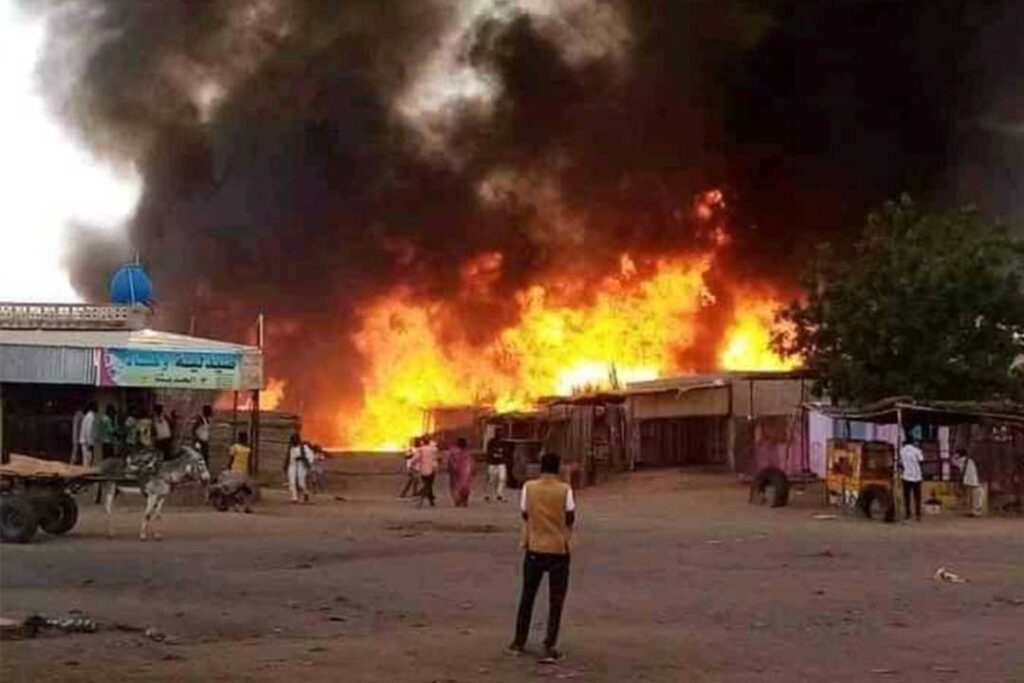ADF STAFF
Montessor Saddam was staying at a camp for displaced people in Sudan’s West Darfur region when members of the Rapid Support Forces (RSF) paramilitary group attacked on November 2.
Over the next three days, the RSF killed 1,300 people and wounded 2,000, local monitors told Al Jazeera. Another 310 were missing.
“They went house to house to search for men and killed each one they found,” Saddam, a pseudonym, told Al Jazeera at a refugee camp in Chad. “There were so many corpses in the streets.”
Other survivors and analysts say the attack was part of a campaign by the RSF and its allied Arab militias to eradicate the non-Arab Masalit tribe from West Darfur.
Video of another incident obtained by The Associated Press showed RSF fighters surrounding men in a village and hurling ethnic slurs. The men were ordered to run. Shots were fired over their heads when they did.
Filippo Grandi, the United Nations High Commissioner for Refugees, fears that escalating violence throughout the Darfur region will lead to atrocities similar to those committed there two decades ago.
In the early 2000s, thousands were killed across Darfur and millions displaced amid fighting between Sudanese government forces backed by the allied militia known as Janjaweed and other rebel groups. The government forces and militias were accused of committing numerous attacks on the African Fur, Masalit and Zaghawa ethnic groups.
“Twenty years ago, the world was shocked by the terrible atrocities and human rights violations in Darfur,” Grandi said in a statement. “We fear a similar dynamic might be developing. An immediate end to the fighting and unconditional respect for the civilian population by all parties are crucial to avoid another catastrophe.”
Rebels that belonged to Janjaweed and other groups are now fighting alongside the RSF.
“They want to ethnically cleanse us,” Nahid Hamid, a Masalit human rights lawyer, told Al Jazeera.
During the previous conflict, former President Omar al-Bashir was accused of pitting ethnic groups against one another.
Over three days in mid-November, 30 people were reportedly killed in clashes between the Habaniya and Salamat ethnic groups in Buram, South Darfur, where the RSF recently took over a Sudanese Armed Forces (SAF) Army base. Neither the RSF nor SAF intervened in the clashes, the Dabanga Sudan newspaper reported.
Since fighting between the RSF and the SAF erupted in April, at least 9,000 people have been killed and more than 5.6 million people displaced, including at least 1.2 million to neighboring countries, according to Alice Wairimu Nderitu, the U.N. special adviser on the prevention of genocide.
The violence includes identity-based killings, rape, and other forms of sexual violence, torture, lootings, enforced disappearances, mass arrests, and bombings of civilian homes and infrastructures.
“Current dynamics in the region could lead to further mass killings in an environment of complete lawlessness and impunity,” Nderitu said in a statement. “The risks of genocide and related atrocity crimes in the region remain grimly high.”
The violence also has spread to Ardamata in West Darfur, an area previously less affected by the fighting. More than 800 people were reportedly killed in Ardamata, which housed a camp for internally displaced people — until nearly 100 of its shelters were burned down. The attack occurred after the RSF overtook a nearby SAF base.
The U.N. in mid-November said preliminary information it obtained from survivors and witnesses suggested that Masalit civilians “suffered six days of terror” during the attack.
“Some of the victims were summarily executed or burnt alive,” spokesman Jeremy Laurence told reporters in Geneva.
Mohamad Arbab, 85, was among six tribal leaders killed by the RSF in Ardamata. The fighters stormed Arbab’s home and killed him, his son and eight grandchildren, according to the Darfur Bar Association.
“They want to kill [our leaders] so they can replace us with their own as well as Arabs from countries like Chad and Niger,” Hamid, the Masalit human rights lawyer, told Al Jazeera.
The violence has forced thousands of Sudanese to flee into neighboring Chad and Niger, although the RSF is accused of blocking some border areas.
Over three days in early November, alone, 7,000 people, mostly women and children with nothing but their clothes, fled into Chad, according to Doctors Without Borders.
A young Sudanese girl said she fled there with her family after her father was killed by the RSF.
“They told me that my brother was killed and we don’t know where he is,” the girl told The Associated Press. “I, my mother and my sister’s children came. We don’t know where my father is. We couldn’t find him. They burned everything and took everything. We did not bring anything with us, only God and our clothes.”

